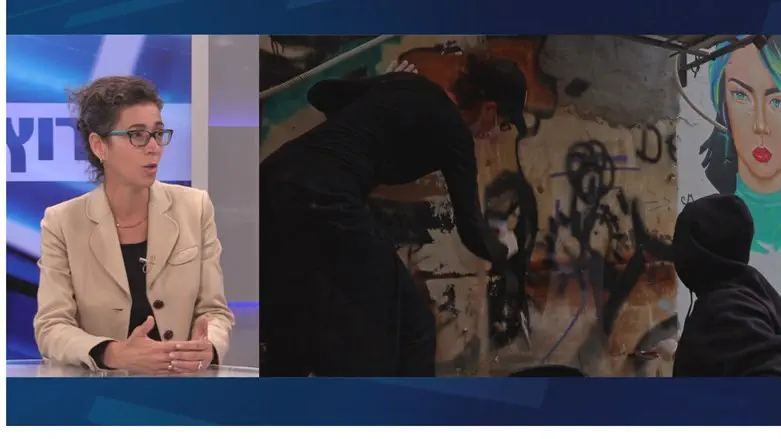
For many years, Sagit was subject to severe domestic violence at the hands of her husband, whose compulsive gambling led the family into dire poverty. The few funds they had, including Sagit's disability allowance from the National Insurance Institute, were used to pay the debts he had accrued.
The first time Sagit managed to get a restraining order against her husband was after one of his violent rampages ended with the hospitalization of one of their children. After that, restraining orders became a part of her life.
Over the years, she turned to the Rabbinical Courts numerous times to request a get, but her husband never showed up to the hearings and she had no attorney to fight for her. Time and time again the suits she filed against her spouse were closed without her obtaining the coveted get.
Two months ago, Sagit arrived at Yad La'isha, hopeless and skeptical, after an alert social worker had referred her to us with the promise that we would be able to help her and the assurance that, "in any case, you have nothing to lose." And this week – 36 years after she had filed her first divorce suit in the Rabbinical Court – Sagit finally obtained her get and became a free woman.
Sagit is not alone. Her particular case reminds me of Miriam, who came to us with a similar story after 14 years of get-refusal. Miriam was abandoned by her husband, who left her with their five young children, no financial pillow and no support. Like Sagit, Miriam initially filed for divorce in the Rabbinical Court and her husband refused to give her the get. Drowning under the weight of raising five children on her own, Miriam too did not return to the courts to pursue her freedom. Only after 14 years, when her children were grown and she was able to lift her head above water, did Miriam reach out to Yad La’isha. After a short period of time, she obtained a get from her husband – who in the meantime had been living with another woman and fathered another child.
Same holds true for Ravit, whose husband was serving prison time for domestic violence against her and their children. She was forced to close her divorce suit a number of times because, "He would show up at the hearings and refuse to grant a get. I just couldn't keep fighting; I couldn't pay for a lawyer, and I couldn't miss any more days of work."
What you might not realize though is that each of these ‘dropped’ cases fall between the cracks in the Rabbinical Court system and aren’t included in the numbers of agunot in Israel. According to their statistics, in 2020, 877 cases were closed without a divorce. Preceding years show similar numbers, but there is no information in the system regarding the circumstances in which each case was closed.
But we know that behind the numbers there are hundreds of women like Sagit, Miriam and Ravit; women who longed for their freedom, but who were forced them to give up in despair along the way. A true aguna in every way other than title, according to the courts.
Orly, on the other hand, did not give up. For seven years she was in and out of the Rabbinical Courts begging for freedom while her husband insisted on first finalizing the property agreement – when he was satisfied with that, he said, he would grant her a get. The couple was already living separately at the time, and he was dating other women. Seven long and precious years passed until Orly turned to us, at which point the tribunal ruled that her husband must grant her the divorce.
Another client, Gitit, walked into our office and opened with an apology: "I know I am not an aguna, but my divorce proceedings have been going on for way too long," she said. "I saw you offer free legal counselling to any woman in the process of a divorce, so I came…".
Gitit didn’t even consider herself as an aguna. She recounted that her husband had been living with another woman, but during Rabbinical Court hearings he would claim that they were merely roommates. He was not willing to let Gitit free until she waived her rights to any share of the property. Gitit IS an aguna, a woman being denied her get, but the system doesn't recognize her as such even though the facts are as plain as day: she wants to move on with her life, but she is chained to her spouse in marriage – while he, on the other hand, has been able to move on with his own life just fine.
More than 50% of the women we represent come to us for help before they are officially recognized by the system as being agunot (there are, of course, exceptional cases of women who are immediately recognized as agunot due to extreme circumstances). Yad La'isha's specialty is to get the tribunal to recognize their status and to implement all legal means until they receive their divorce.
As the Jewish world marks International Aguna Day this week, we must remember that behind the numbers, and even behind the numbers we don’t see, there are real women with painful and tragic stories. Women who have been cruelly robbed of their freedom and forced to embark on a long and difficult journey in search of what is, in the 21stcentury, supposed to be their natural right. We are here to fight for them.
*All the names mentioned in the article are pseudonyms.
Pnina Omer is the director of Yad La'isha: the Monica Dennis Goldberg Legal Aid Center and Hotline for Agunot, part of the international Ohr Torah Stone network.